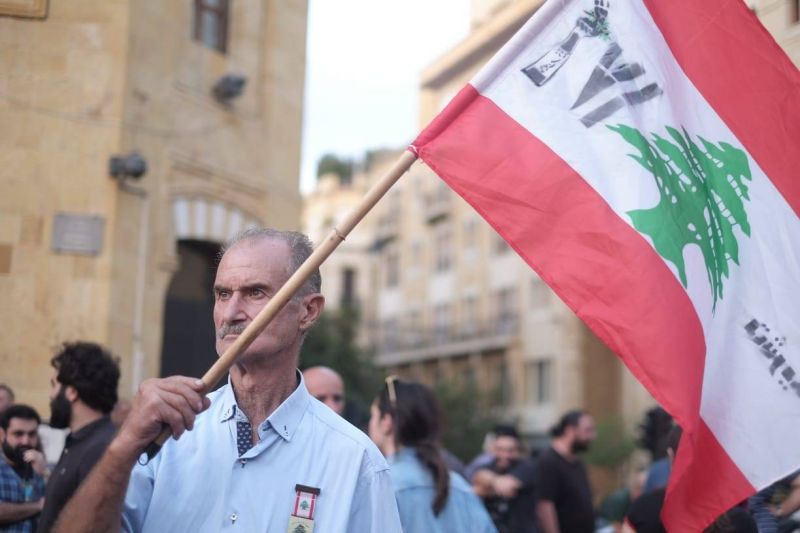
A man protests at the third anniversary of the Lebanese Oct. 17, 2019 uprisings near Martyrs' Square. (Credit: João Sousa/L'Orient Today)
Want to get the Morning Brief by email? Click here to sign up.
“The Oct. 17 movement has not come to an end. It is a long-term struggle," a protester said yesterday as demonstrators commemorating the third year since the eruption of popular uprisings propped up a fist statue in Martyrs’ Square, Downtown Beirut, emblematic of the protest movement. A few dozen activists gathered in Downtown Beirut to commemorate the third anniversary of Oct. 17, 2019 which marked the start of unprecedented mass protests rallying hundreds of thousands of demonstrators for several months across public spaces in Lebanon. “People have gone back to their zaims (leaders), to sectarianism,” a protester told L'Orient Today, lamenting the meager turnout and reminiscing over early protest days when popular chants condemned the entirety of politicians. Forces of Change MP Najat Aoun Saliba, associated with the Oct. 17 protest movement, on the other hand, blamed the sparse attendance on “the economic crisis.” Saliba added that “It would be great if the street could push for the presidential election to be held,” as the first two parliament sessions to elect a new president failed to designate a new head of state amid the looming deadline in just 13 days. The popular uprisings in 2019 led to then-Prime Minister Saad Hariri’s resignation. Collectives from the protest movement, in a Sunday statement reported by the state-run National News Agency, called for a demonstration in parallel with Thursday’s third attempt to elect a president.
The Health Ministry yesterday reported 46 additional confirmed cholera cases in 48 hours, bringing the total number of infections to 89. Meanwhile, the United Nations Children’s Fund (UNICEF) published a report on its planned action to curb disease spread. Another person has died from cholera over the past 48 hours, the third such death since Lebanon recorded its first infection on Oct. 6. MP Abdul Rahman Bizri (Independent/Saida) in an interview with Voice of Lebanon yesterday stressed the importance of securing clean water sources while expressing concern over the disease potentially spreading in schools, "especially public ones.” UNICEF meanwhile vowed to procure “bleach, hand sanitizer, liquid soap, and water purification tablets” for over 2,000 public and private learning centers. The international organization also declared having supplied fuel to power water infrastructure, procured emergency medical supplies and trained frontline workers. Lebanon’s first cholera outbreak in nearly three decades spread in rural areas in the north of the country, raising concerns about the possibility of the disease reaching more people or, even worse, overwhelming the already collapsed public health system.
Parliament will meet today at 11 a.m., according to the state-run National News Agency, to vote on a number of draft laws including an amended version of a law that would lift banking secrecy which was approved in July but sent back by President Aoun. Aoun said the reason he sent it back is for Parliament to make certain modifications to the time period to which it applies, “so that it covers at least the period during which the [current economic] crisis was caused.” Lifting banking secrecy is one of the key demands of the International Monetary Fund to unlock $3 billion in financial assistance. If Parliament approves the law today, it will take effect even if Aoun refused to sign it. The IMF has previously criticized the approved version of the law. During today’s session, Parliament will also elect its secretaries and members of its committees. It will also vote on a $150 million loan from the World Bank to finance wheat imports.
The Swiss Embassy in Beirut indefinitely postponed an “informal dinner” aiming to “brainstorm” ahead of “consultative discussions” after the event sparked controversy, including what some observers interpreted as criticisms on Twitter from the Saudi ambassador to Lebanon. The Swiss diplomatic mission told L’Orient Today the discussions planned to group regional and international actors with the ensemble of Lebanese politicians. The Swiss diplomats did not mention the aim of the discussions while maintaining they would take place in “full respect of the Taif agreement.” The 1989 agreement ending the Lebanese civil war after 15 years gets its name from Taif, Saudi Arabia where it was signed. “The Taif agreement is a binding contract … the alternative is not another pact but the disintegration of coexistence,” Saudi Ambassador to Lebanon Walid Bukhari on Sunday wrote on Twitter. Bukhari met with President Michel Aoun yesterday, discussing Lebanon’s “Arab anchorage” recalling the Saudi diplomat’s Twitter warning of “replacement by entities that do not resemble the Lebanese message.” The meeting also addressed the upcoming presidential elections, which Bukhari hoped would take place before the “constitutional deadline.”
“We cannot elect a president without dialogue, and [Parliament Speaker Nabih] Berri has a great role to play in this framework,” Free Patriotic Movement head Gebran Bassil said yesterday after a meeting with the legislative head ahead of Thursday’s third attempt to elect a new president. Less than two weeks remain before Oct. 31, the end of President Michel Aoun’s term and the constitutional deadline to elect his successor. The FPM head urged for consensus as no signs indicated common ground among MPs regarding the next head of state. Maronite Patriarch Bechara al-Rai also urged for agreement among parties while decrying a perceived “veto and obstruction.” The last election session failed to reach quorum after the majority of MPs present during the first parliamentary session voted blank. Prior to Aoun’s election, voting sessions were stalled for two years until an agreement between parties could be reached. If MPs don’t elect a president by the deadline while a caretaker cabinet is in force, Lebanon will face its first total executive vacuum.
In case you missed it, here's our must-read story from yesterday: “Is Beirut’s National Museum in danger amid the financial crisis?”